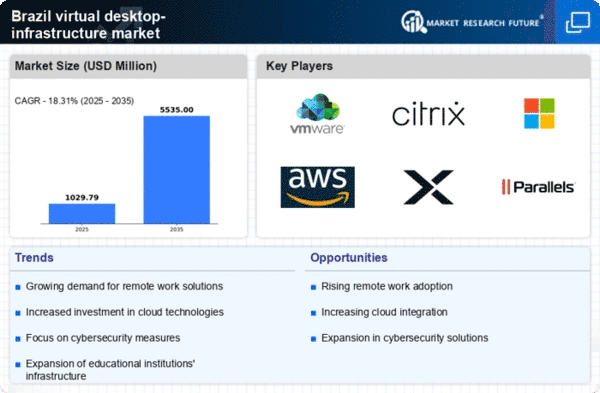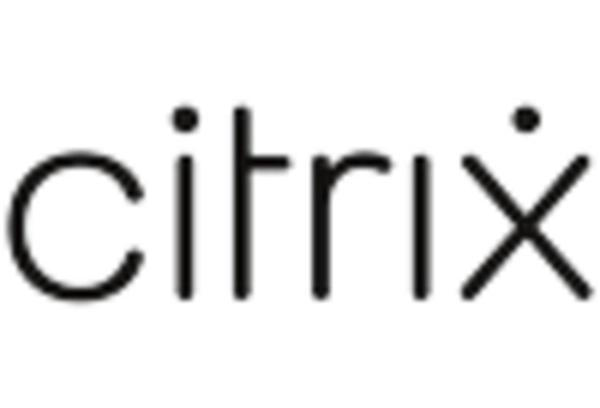Increased Focus on Data Security
Data security is a critical concern for organizations in Brazil, driving the growth of the virtual desktop-infrastructure market. With the rise in cyber threats and data breaches, companies are prioritizing secure access to sensitive information. Virtual desktop solutions offer enhanced security features, such as centralized data storage and robust access controls, which are essential for protecting corporate data. The Brazilian government has also implemented regulations that mandate strict compliance with data protection standards, further emphasizing the need for secure IT environments. As organizations strive to meet these regulatory requirements, the demand for virtual desktop solutions that ensure data integrity and confidentiality is likely to increase. This heightened focus on security not only safeguards organizational assets but also fosters trust among clients and stakeholders, thereby propelling the virtual desktop-infrastructure market forward.
Growing Demand for Remote Work Solutions
The virtual desktop-infrastructure market is experiencing a notable surge in demand for remote work solutions in Brazil. As organizations increasingly adopt flexible work arrangements, the need for secure and efficient remote access to desktop environments has become paramount. This shift is reflected in a reported growth rate of approximately 15% in the adoption of virtual desktop solutions among Brazilian enterprises. Companies are seeking to enhance productivity while ensuring data security, which is driving investments in virtual desktop technologies. Furthermore, the ability to provide employees with seamless access to applications and data from various devices is likely to bolster the market's expansion. This trend indicates a significant transformation in workplace dynamics, positioning the virtual desktop-infrastructure market as a critical component in the future of work in Brazil.
Cost Efficiency and Resource Optimization
Cost efficiency remains a pivotal driver in the virtual desktop-infrastructure market. Brazilian businesses are increasingly recognizing the potential for substantial savings through the implementation of virtual desktop solutions. By centralizing desktop management and reducing the need for physical hardware, organizations can lower operational costs significantly. Reports suggest that companies can save up to 30% on IT expenditures by transitioning to virtual desktops. This financial incentive is particularly appealing to small and medium-sized enterprises (SMEs) in Brazil, which often operate with limited budgets. Additionally, resource optimization through virtualization allows for better allocation of IT resources, enabling organizations to focus on strategic initiatives rather than routine maintenance. As cost considerations continue to influence decision-making, the virtual desktop-infrastructure market is likely to see sustained growth in Brazil.
Technological Advancements in Virtualization
Technological advancements are playing a crucial role in shaping the virtual desktop-infrastructure market. Innovations in virtualization technologies, such as improved graphics performance and enhanced user experience, are making virtual desktops more appealing to Brazilian enterprises. The introduction of high-performance virtual desktop solutions enables organizations to run resource-intensive applications seamlessly, which is particularly beneficial for sectors like design and engineering. Furthermore, advancements in cloud computing and network infrastructure are facilitating the deployment of virtual desktops, making them more accessible to a broader range of businesses. As these technologies continue to evolve, they are likely to drive further adoption of virtual desktop solutions in Brazil, positioning the market for sustained growth and innovation.
Rising Need for Business Continuity Solutions
The need for business continuity solutions is increasingly influencing the virtual desktop-infrastructure market. Brazilian organizations are recognizing the importance of maintaining operational resilience in the face of unforeseen disruptions. Virtual desktop solutions provide a robust framework for ensuring business continuity by enabling remote access to critical applications and data. This capability is particularly vital for industries that require uninterrupted service delivery, such as finance and healthcare. As companies invest in strategies to mitigate risks associated with operational interruptions, the demand for virtual desktop solutions is expected to rise. This trend underscores the role of virtual desktop infrastructure as a key enabler of business continuity, further solidifying its importance in the Brazilian market.
















